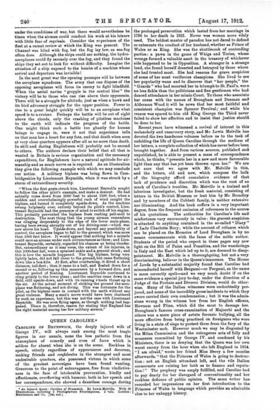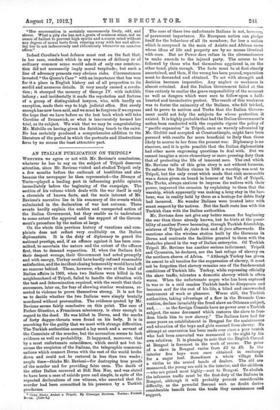QUEEN CAROLINE.* CAROLINE OF BRUNSWICK, the deeply injured wife of
George IV., will always rank among the most tragic figures in our annals, none the less pathetic from the atmosphere of comedy. and even of farce which is seldom far absent when she is on the scene. Reckless in speech, utterly regardless of appearances and decorum, making friends and confidantes in the strangest and most undesirable quarters, she possessed virtues in which some of the greatest sovereigns have been found wanting. Generous to the point of extravagance, free from vindictive- ness in the face of intolerable provocation, kindly and affectionate, overflowing with humour, both in her speech and her correspondence, she showed a dauntless courage during
• An Injured Queen: Caroline of Brunswick. By Lewis Melville. With 39 Illustrations, including 2 Photogravure Frontispieces. 2 vols. London: Hutchinson and Co. [24s. net.]
the prolonged persecution which lasted from her marriage in 1796 to her death in 1821. Never was woman more vilely used. The boldest master of paradox has not dared to defend or extenuate the conduct of her husband, whether as Prince of Wales or as King. She was the shuttlecock of contending parties : a pawn in the game of Whigs and Tories, whose wrongs formed a valuable asset in the treasury of whichever side happened to be in Opposition. A stranger in a strange land, she found herself deserted and betrayed by those whom she had trusted most. She had reasons for grave suspicion of some of her most vociferous champions. She lived to see her popularity wane and to discover that " her people," the " Guards " who had escorted her in triumph to St. Paul's, were- no less fickle than the politicians and fine gentlemen who had danced attendance in her mimic Court. To those who associate her cause with the names of Brougham and Denman and Alderman Wood it will be news that her most faithful and consistent champion was Spencer Percival;' and while his reason was spared to him old King George the Third never failed to show her affection and to insist that justice should be done to her.
Recent years have witnessed a revival of interest in this melancholy and unsavoury story, and Mr. Lewis Melville has devoted the two handsome volumes before us to the task of unfolding the life of Queen Caroline through the medium of her letters, a complete collection of which has never before been brought together. And from various sources, published and unpublished, he is able to present a mass of correspondence which, he thinks, " presents her in a new and more favourable light than any that has yet been thrown upon her." We are not sure that we agree with Mr. Melville in this, and the letters, old and new, which compose the bulk of the biography afford cumulative evidence of that lack of prudence and discretion which was the root of so much of Caroline's troubles. Mr. Melville is a trained and laborious investigator, but the fresh material, consisting of letters in the British Museum or lent him by Mr. Broadley and by members of the Cobbett family, is neither extensive nor illuminating. And the book suffers in a very important degree, from the frequent omission of references to the source- of his quotations. The authorities for Caroline's life and' misfortunes vary enormously in value : the gravest suspicion, is attached to anything contained in the so-called "Diary" of Lady Charlotte Bury; while the amount of reliance which can be placed on the Memoirs of Lord Brougham is by no means commensurate with the fame of the noble author. Students of the period who expect in these pages any new light on the Bill of Pains and Penalties, and the wanderings. in Italy and the East which led up to it, are doomed to disap- pointment. Mr. Melville is a thoroughgoing, but not a very discriminating, believer in the Queen's innocence. The House of Lords by a substantial majority found that Caroline had misconducted herself with Bergami—or Pergami, as the name is more correctly spelt—and we very much doubt if on the same evidence a special jury to-day, under the direction of a Judge of the Probate and Divorce Division, would do other- wise. Many of the Italian witnesses were undoubtedly per- jured, and some of the incredibly gross incidents to which they swore carried their own condemnation ; but it was the admis- sions wrung in the witness box from her English officers, Hownam and Flinn, which did the most to damage her. Brougham's famous cross-examination of Majocchi and the others was a mere piece of astute forensic bullying, all the more effective from being practised on foreigners who were living in a state of siege to protect them from the fury of the Westminster mob. However much we may be disgusted by the Milan Commission and the outrageous acts of folly and meanness committed by George IV. and condoned by his Ministers, there is no denying that the Queen was her own worst enemy from the hour when she left England in 1814. "I am afraid," wrote her friend Miss Berry a few months afterwards, "that the Princess of Wales is going to destruc- tion : not an English attendant left, and the vile Italian cormorants are ruining her both as to finance and reputa- tion!" The prophecy was amply fulfilled, and Caroline had to pay dearly for her disregard of conventionality and her reckless defiance of public opinion. The same writer has recorded her impressions on her first introduction to the Princess of Wales in language which provides an admirable clue to her unhappy history.
"Her conversation is certainly uncommonly lively, odd, and clever. What a pity sho has not a grain of common sense, not an ounce of ballast to prevent high spirits and a coarse mind without any degree of moral taste from running away with her and allow- ing her to act indecorously and ridiculously whenever an occasion offers."
Indeed Caroline's best defence must rest on the fact that, in her case, conduct which in any woman of delicacy or of ordinary common sense would admit of only one construc- tion did not necessarily imply moral turpitude ; but such a line of advocacy presents very obvious risks. Circumstances invested " the Queen's Case " with an importance that has won for it a place in English history out of all proportion to its sordid and nauseous details. It very nearly caused a revolu- tion ; it stamped the memory of George IV. with indelible infamy ; and incidentally it made the reputation and fortune of a group of distinguished lawyers, who, with hardly an exception, made their way to high judicial office. But surely enough has now been said, and we must be forgiven if we express the hope that we have before us the last book which will take Caroline of Brunswick, or what is inaccurately termed her trial, as its subject. We wish that we may be congratulating Mr. Melville on having given the finishing touch to the cairn. He has certainly produced a comprehensive addition to the literature of the period in which the portraits and illustrations form by no means the least attractive part.







































 Previous page
Previous page